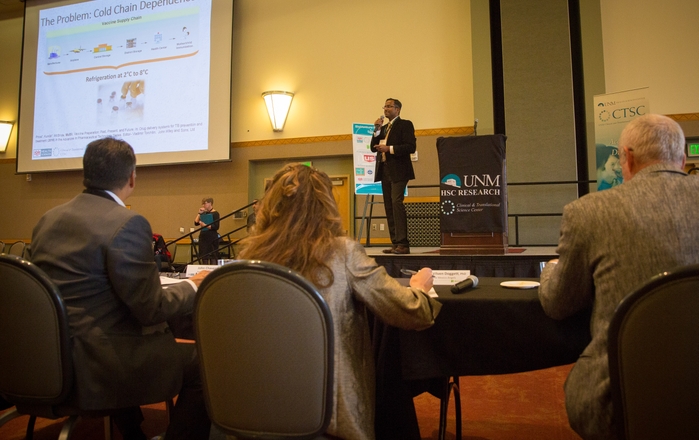 Pavan Muttil, PhD, Describes His Vaccine Stability Technology at BioVenture 2018
Pavan Muttil, PhD, Describes His Vaccine Stability Technology at BioVenture 2018
Bioscience Bonding Experience
UNM Health Sciences Center bioscience inventors had rare opportunity this week to woo potential investors by presenting their ideas at a first-of-its-kind event that brought together entrepreneurs and researchers.
More than 125 people gathered Wednesday afternoon at UNM’s Student Union Ballroom for the HSC BioVenture Partnership, which included idea pitches from three scientists, presentations from faculty members who have launched successful startups and poster presentations from other research teams.
“What we’re trying to do here is bring together the entrepreneurs with the inventors to develop relationships that will hopefully stimulate new business in New Mexico,” said Richard S. Larson, MD, PhD, executive vice chancellor at the Health Sciences Center.
Larson is also director of the UNM Clinical & Translational Science Center and chair of the New Mexico Bioscience Authority, both of which co-sponsored the event. “Both are tasked with improving technology transfer from the university into the private sector,” he explained.
Presentations from the three startup founders – and their business partners – set the tone for the afternoon.
Dave Peabody, PhD, professor in the Department of Molecular Genetics & Microbiology, was joined by Michael Perrine, director of business development at Agilvax, Inc.. They described novel technology that permits the specialized design of vaccines and cancer therapies.
Larry Sklar, PhD, Distinguished Professor at the UNM Center for Molecular Discovery, and Terry Dunlay, the retired founder, CEO and president of Intellicyt, told how Sklar’s invention of high-throughput flow cytometry spurred the formation of a thriving business headquartered in Albuquerque that has 90 employees. It saw $16 million in revenue in 2016 and more than $24 million in 2017, Dunlay said.
Vision Quest and its founder, Pete Soliz, PhD, licensed technology developed by Mark Burge, MD, deputy director of the CTSC and Regent’s Professor in the Department of Internal Medicine, that uses thermal technology to screen for early signs of diabetic peripheral neuropathy.
In a “Shark Tank”-like competition, Health Sciences researchers Pavan Muttil, Brandi Fink and Nancy Kanagy each pitched their ideas for biotech spinoffs to a panel of judges.
Muttil, an associate professor in the Division of Pharmaceutical Sciences, told how he and his colleagues had developed a way to make vaccines temperature-stable, so that they no longer need expensive refrigeration. In developing countries, “the last mile” is where the “cold chain” of refrigerated storage and transportation breaks down, Muttil said, adding that in the Third World, 20 to 50 percent of all vaccines are wasted.
Fink, an assistant professor in the Department of Psychiatry & Behavioral Sciences, presented her idea of providing college students with a mobile app that helps them modify their drinking behavior. The interactive tool provides users with a variety of tools to log their alcohol intake, help them alleviate stress and calculate their blood alcohol level.
Nancy Kanagy, a professor in the Department of Cell Biology and Physiology, pitched new technology for assessing the presence and severity of peripheral artery and small vessel disease. A small, wearable device measures biomarkers that are released through the skin and could be used in a doctor’s offices, she said.
The judges praised all three researchers for the quality and originality of their ideas, but in the cases of Muttil and Fink questioned whether they had done enough work to identify their target markets.
Kanagy’s winning pitch, they concluded, was “a very interesting product, a very big market and a very good presentation.”
